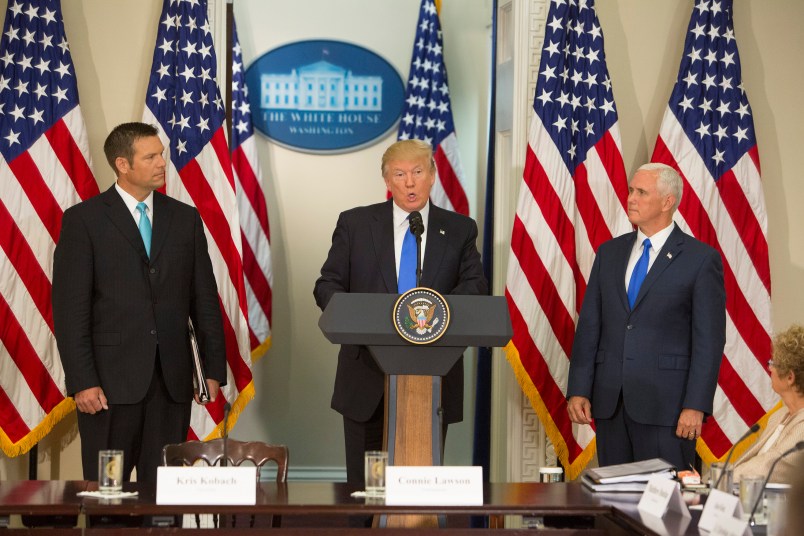After announcing he was dissolving his bogus voter fraud committee to avoid tumultuous legal battles, President Donald Trump on Thursday promoted what he said was the need for voter ID laws.
“System is rigged, must go to Voter I.D.,” Trump tweeted. “As Americans, you need identification, sometimes in a very strong and accurate form, for almost everything you do … except when it comes to the most important thing, VOTING for the people that run your country.”
Trump’s message runs counter to the emphasis of the voter fraud commission, which has emphasized the need to purge voter rolls over voter ID laws.
Trump also tweeted that it was “mostly Democratic states” that refused to share voter data because “they know that many people are voting illegally.”
Many mostly Democrat States refused to hand over data from the 2016 Election to the Commission On Voter Fraud. They fought hard that the Commission not see their records or methods because they know that many people are voting illegally. System is rigged, must go to Voter I.D.
— Donald J. Trump (@realDonaldTrump) January 4, 2018
As Americans, you need identification, sometimes in a very strong and accurate form, for almost everything you do…..except when it comes to the most important thing, VOTING for the people that run your country. Push hard for Voter Identification!
— Donald J. Trump (@realDonaldTrump) January 4, 2018
Trump issued an executive order Wednesday evening, effectively dissolving his Presidential Advisory Commission on Election Integrity. In a statement, he said he made the decision because he wanted to avoid “endless legal battles at taxpayer expense.” The commission is facing numerous lawsuits from civil rights and privacy groups who complain the panel is being used to push for voting restrictions and that the data requests violate privacy laws.
A large swath of states repeatedly rejected the commission’s requests for voter data. The commission initially asked states for information like addresses, military status and the last four digits of voters’ Social Security numbers. The commission later requested publicly available voter data, but many Democratic and Republican-majority states continued to refuse.







I don’t understand, why don’t they fight for what’s right? This committee was all about integrity…HAAAAA! I’ll stop now. What a joke.
“People are saying” 3 million “illegals” voted in the last election yet they run away from trying to prove it? Whatever. Ruse. Sham. Fraud. Or, as the TPM blogger wrote, “bogus”.
Why? He just needed a time out to change his diapers.
He’ll be back.
Things are starting to collapse around this jacka$$, and I couldn’t be more pleased. I do take pause at the maneuver racist elf played yesterday by appointing 17 federal prosecutors in impromptu fashion (using executive order, no less) JUST prior to the deadline to seat replacements. (full candor, I didn’t know about the law)
Oh, and wouldn’t you know, he placed a Guliani sheep into one of the two NY districts that handles RUMP family crime syndicate business affairs. Maddow did a thing on it yesterday. Rethugs are desperately trying to save this fools §residency!!!
Sadly, the House Republiscums may take him up on passing a bill requiring voter i.d.'s.
Let’s keep in mind that this is a man who felt President Obama’s verified birth certificate from Hawaii was not sufficient i.d. In other words, he’s a racist.